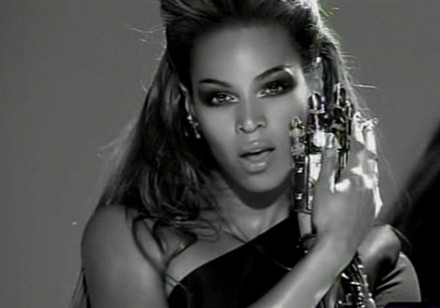Sasha Fierce and Utopian Relationships of Gender and Technology
 In November I read a post on Jezebel positing that “critics have been misinterpreting Beyoncé’s overtly pro-woman lyrics as being anti-feminist ever since 1999’s “Bills, Bills, Bills.” Whether or not this is true, it’s hard to understate the pure (mostly female) euphoria one experiences when Single Ladies (Put a Ring On It) comes on at a party, and I thought it would be interesting to consider Beyoncé’s recent foray into the world of pop diva alter-egos in light of trying to get at a personal conception of a Utopian relationship between Gender and Technology. In case any one missed it, Sasha Fierce is Beyoncé’s on-stage/in-video intensely charismatic, enigmatic, and slightly robotic alter-ego who allows B to shed her every day personality which is actually rather shy, for an international pop superstar. And, by Donna Haraway’s standards, Sasha Fierce is a cyborg. Check out the awesome robot hand.
In November I read a post on Jezebel positing that “critics have been misinterpreting Beyoncé’s overtly pro-woman lyrics as being anti-feminist ever since 1999’s “Bills, Bills, Bills.” Whether or not this is true, it’s hard to understate the pure (mostly female) euphoria one experiences when Single Ladies (Put a Ring On It) comes on at a party, and I thought it would be interesting to consider Beyoncé’s recent foray into the world of pop diva alter-egos in light of trying to get at a personal conception of a Utopian relationship between Gender and Technology. In case any one missed it, Sasha Fierce is Beyoncé’s on-stage/in-video intensely charismatic, enigmatic, and slightly robotic alter-ego who allows B to shed her every day personality which is actually rather shy, for an international pop superstar. And, by Donna Haraway’s standards, Sasha Fierce is a cyborg. Check out the awesome robot hand.
The idea that Sasha Fierce adds (to paraphrase Haraway) “lively” machinery to Knowles’ “inert” existence, creating a fabulous cyborg of epic pop stardom is really interesting, especially since the lyrics in her songs speak to pure independence and self-worth. In “Diva” she spits: “where my ladies up in here who like to talk back?” and “take it to another level/no passengers on my plane,” while in Single Ladies insists that she “can care less what you think/I need no permission.” What actual technologial purpose the robohand serves is unclear and kind of unimportant. What is important is what it represents, a personal and professional progression for an incredibly successful woman, and a concrete example of how cyborgs have already entered our societal and cultural consciousness. She is a woman utterly unafraid of becoming part of technology, or of technology becoming a part of her.
Conversely, it’s possible to argue that Sasha Fierce is just another sexy gendered robot, an alter-ego who serves as an emotional crutch for a powerful woman unable to handle her success with only one personality, trying to create depth with a titanium glove. In another song from her album, Knowles flips genders, considering how her navigation of gender roles in a relationship would be different “If I were a boy,” and Sasha Fierce is absent. It’s only Beyonce, trapped by expectations of how a woman should behave and what she should put up with in a heterosexual relationship, but critiquing these expectations and turning them on their heads. I like to think Sasha has greater repercussions, especially in light of the fact that the feminist connotations Knowles has created with her do not cleave exactly to mainstream, white liberal feminism and represent a possible experiment in considering the “oppositional consciousness” which Haraway cites as being part of the “network” of space and identities which women of color in the United States navigate.

Comments are closed.